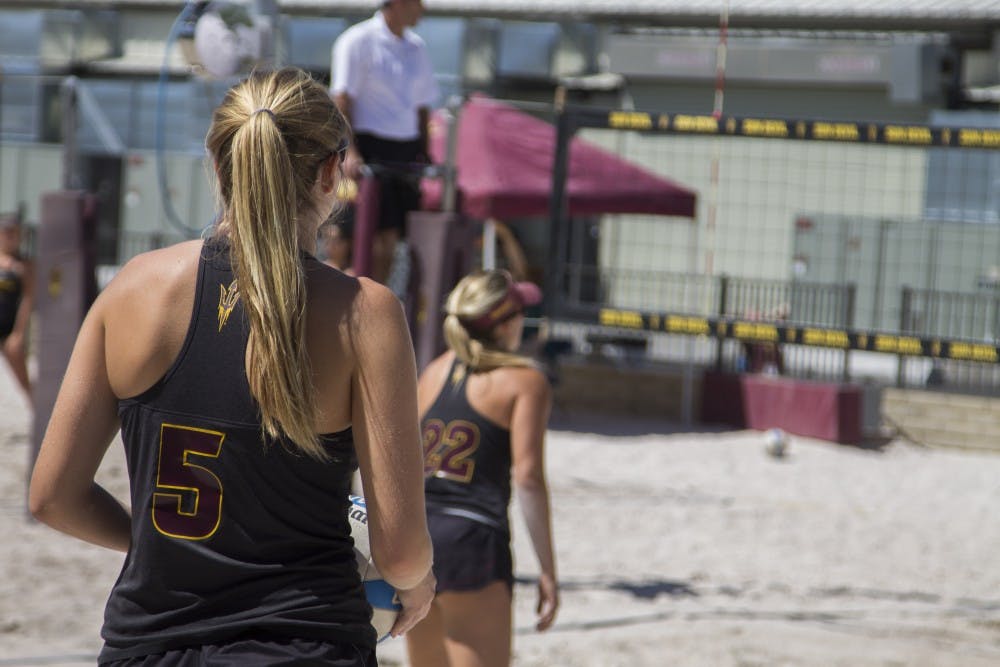At ASU beach volleyball’s first game of the season, the team fell 3-2 to New Mexico. However, the March 4 loss in no way foreshadowed the rest of the season. Heading into the Pac-12 Beach Volleyball Championship this weekend, the team boasts an all-time school record of 11 wins in the season.
The team had three wins in 2013, the program's first season. The next year, interim head coach Jacquelyn Bunker added Assistant Coach Deb Rose, a beach volleyball competitor in the 1996 Olympics. ASU increased its win total to five games.
“Last year, I think the big change was that we brought Deb in,” Bunker said. “This year, when Jason (Watson) left, Deb and I went ahead and worked together full-time on the program. That was a big change because Deb was just a volunteer before.”
The loss against Arizona on April 20 concluded the regular season, putting ASU at an even 11-11 record. With more than double the amount of wins than last year, and more wins than every previous year combined, junior Bianca Arellano commented on the team’s improvement.
“We’ve made that transition where we aren’t just using our indoor game and throwing it out on the sand,” Arellano said. “We have our own mindset with actual beach recruits and actual beach coaches. It’s bringing our level up ten notches.”
Originally, when ASU added the program along with ice hockey, indoor volleyball players tested out the sand. They tried to transfer the same techniques to the sand — they didn't translate.
“I think it’s helped a lot having two separate teams,” redshirt sophomore Kwyn Johnson said. “It was really hard when it was mostly indoor girls coming out for beach.”
Another reason it was difficult to transfer from indoor to sand: Many players trained for the U.S. Collegiate National tryouts, which take place in mid-February. After preparing for those for the entire offseason, the athletes only had about two weeks to practice on sand before the start of the beach volleyball season in March.
With a majority of players competing only in beach, practices began in August instead. It gave them more time to learn.
“Last year, we had good knowledge, but they can only absorb so much information,” Bunker said. “So, the amount of information we could give them and expect them to be successful had to be limited.”
Bunker attributes the team’s success to dedicating more time to the beach game.
“We had the whole year to be able to work on teaching the beach game the way it needs to be taught,” Bunker said. “This allowed us to get more in depth of the game, and teach the girls at a higher level.”
However, Arellano claims the players are responsible for their success as well.
“It’s actually a lot of coaching yourself, too,” she said. “As players, we're developing our own types of strategies. You can only talk to your coach so much during a game.”
The focus on beach is expected to increase from here, in large part due to Title IX. ASU’s "Title IX Statement," mandates that, “ASU does not discriminate on the basis of sex in the employment, education programs or activities it operates.”
By prohibiting gender discrimination, and granting females equal access to sports, ASU programs receive federal funding, which includes scholarships. Simply put, there must be an equal number of scholarships given to female athletes as male athletes at the school. Ultimately, the beach program will receive six scholarships to split among 13 players. The team currently has only two scholarships.
“Next year we’re hoping for five, and then the following season we’ll be fully funded with six,” Bunker said. “We’ve got five kids coming in next year, and that’s all attributed to the addition of federal funding.”
With scholarships on the line for potential ASU athletes, Bunker sees this as yet another way to increase the intensity.
“I think that’s definitely going to help us be more competitive,” Bunker said. “There are less and less kids doing both, and so the only way that happens is if you get beach-only kids that are scholarship-caliber type kids.”
Heading into the Pac-12 Beach Volleyball Championships this weekend in Los Angeles, the team finishes its final practices this week. Due to NCAA compliance rules, Bunker is not allowed to hold an “organized team practice” after the tournament. To keep the team in shape until August, a strength and conditioning coach will provide the girls with daily workouts.
“The girls will have workouts that they can do, but the best thing for them to do is just go play,” Bunker said. “The girls, a lot of the time, will play in co-ed tournaments which help because they’re playing with a higher net against men, so it’s a little harder to execute.”
Related links:
ASU beach volleyball falls to Arizona on Senior Night
Follette becomes first ASU beach volleyball player to win 30 games
Reach the reporter at ncorr@asu.edu or follow @natalieorr19 on Twitter.
Like The State Press on Facebook and follow @statepress on Twitter.




